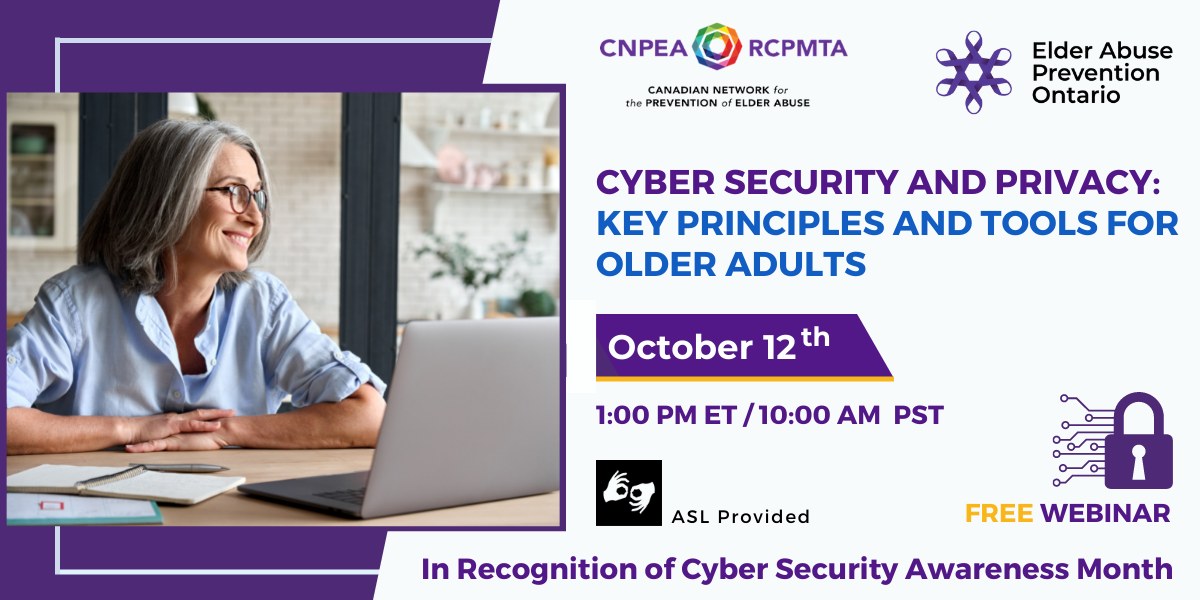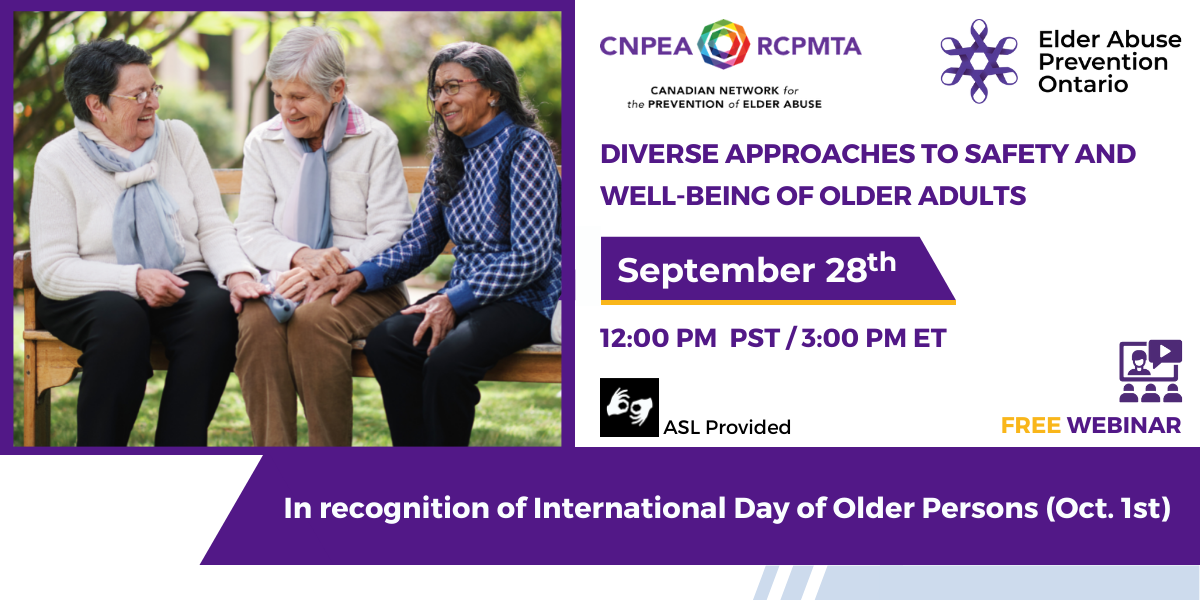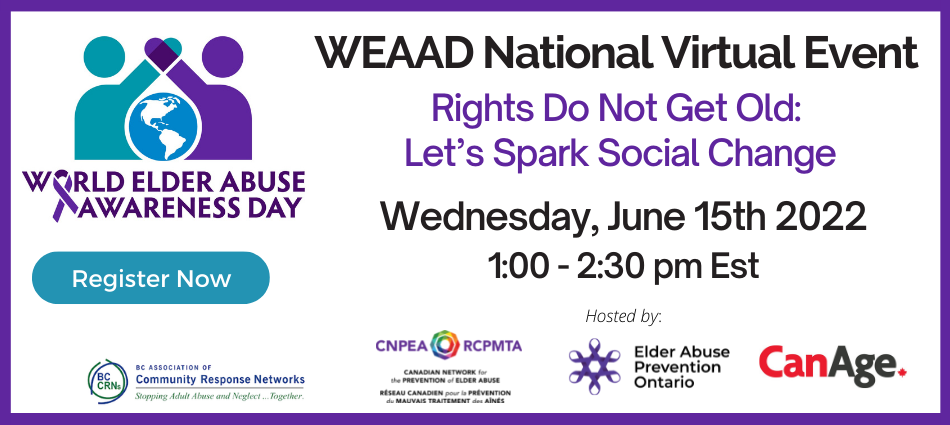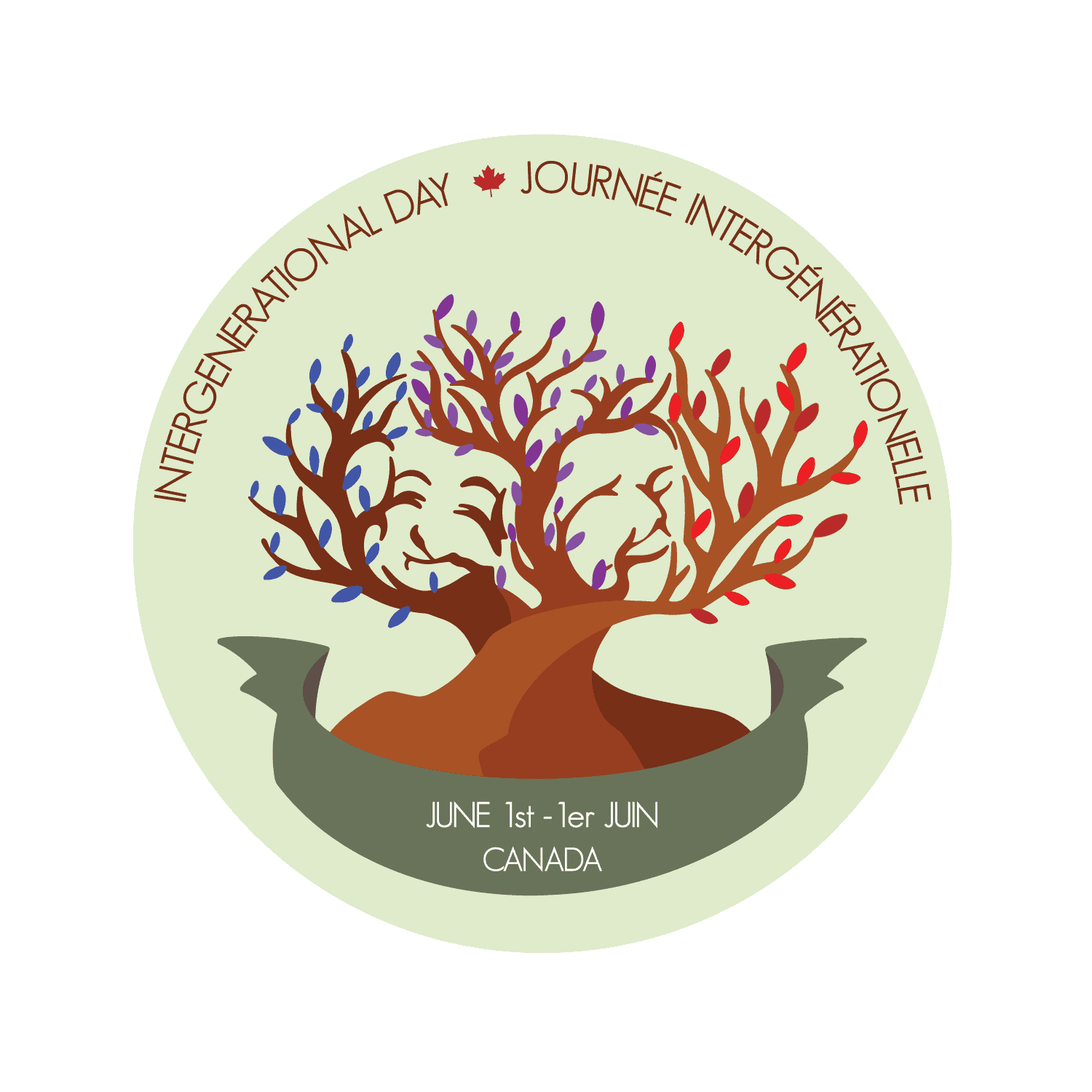To mark Cyber Security Awareness Month, CNPEA, in collaboration with Elder Abuse Prevention Ontario, hosted a series of webinars in October focusing on online safety and security. Scroll to learn more about these webinars and watch the recordings:
OCTOBER 12
Cyber Security and Privacy: Key principles and tools for older adults
10 AM Pacific / 1 PM Eastern
Wactch the recording here:
Panel conversation with guests who work to increase digital literacy, safe behaviours online, as well as online privacy and security for older people using technology. ASL interpretation available. Learn more about the event.
Confirmed Panelists:
- Kara Brisson-Boivin, Ph.D. Sociology (she/her/elle), Director of Research, MediaSmarts
- Lisa Kearney, Founder and CEO, Women CyberSecurity Society and International Women in Cyber Day
- Emily Mullins, Knowledge Broker, Ontario Age-Friendly Community Outreach Program - Centre for Studies in Aging and Health
- Debra Popa, MBA, Executive Director, KnowledgeFlow Cybersafety Foundation
Resources discussed during the webinar:
Debra Popa, Knowledge Flow:
- For all initiatives related to older adults, go to https://knowledgeflow.org/initiatives/seniors/
- FREE resources for non-profits at https://knowledgeflow.org/cyberhub/
- You can email your scam examples (for training purposes) at
Emily Mullins, Ontario Age-Friendly Community Outreach Program-Centre for Studies in Aging and Health
- Dig-IT digital literacy program for older adults: https://seniorsdig-it.ca/
- Summary report on Best Practices for Digital Literacy Programs: https://cnpea.ca/en/tools/practice-tools/1316-older-adults-digital-literacy-best-practices
- Ontario Age-Friendly Communities Outreach Program: https://sagelink.ca/age-friendly-communities-ontario/
Lisa Kearney, Founder and CEO, Women Cyber Security Society
- https://womencybersecuritysociety.org/
- For information about the next free cybersecurity workshop, top 5 tips cyber security tips and more: https://gem.godaddy.com/s/568dc41
- Email your questions at
Kara Brisson-Boivin, MediaSmarts
- mediasmarts.ca
- Tips Cyber Security: Spam, Scams, Frauds and Identity Theft:
https://mediasmarts.ca/digital-media-literacy/digital-issues/cyber-security/cyber-security-spam-scams-frauds-identity-theft - Discover Online Safety: free, bilingual and virtual event (held via Zoom) Mon, 24 October 2022, 2:00 PM – 3:30 PM EDT: https://www.eventbrite.ca/e/discover-online-safety-workshop-get-cyber-safe-mediasmarts-tickets-425758153097
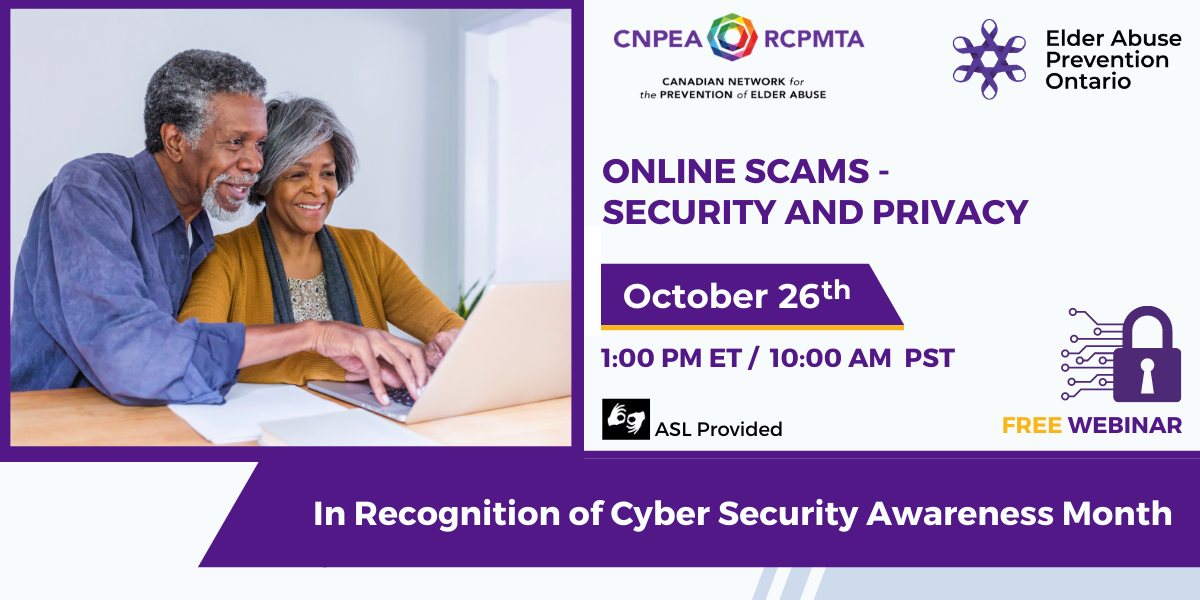
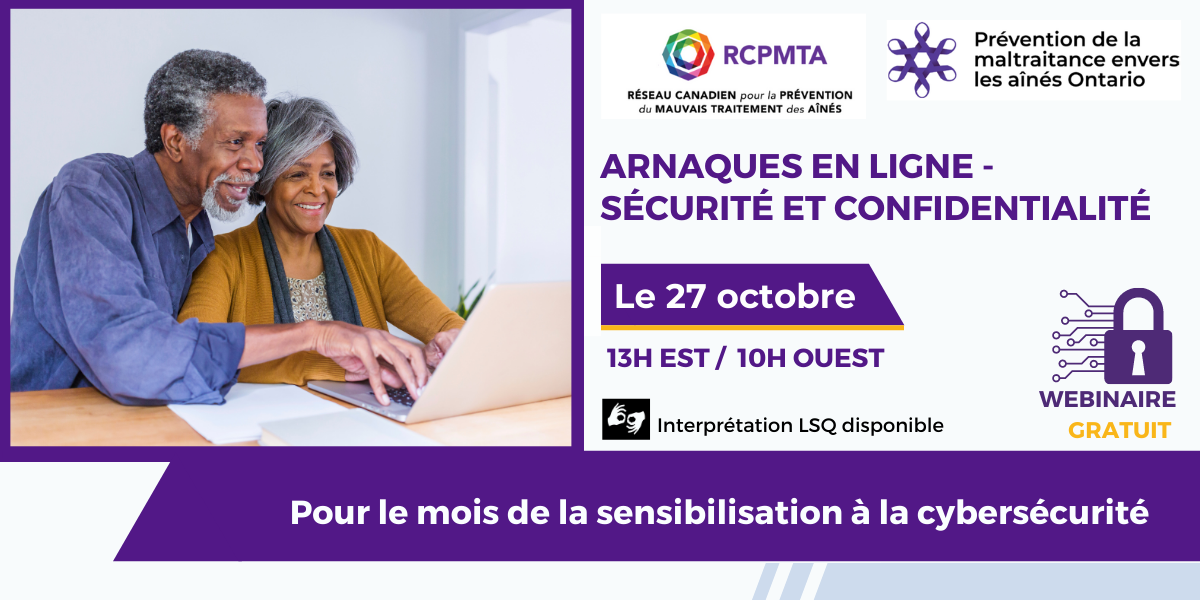
OCTOBER 26 and 27
Online Scams - Security and Privacy
10 AM Pacific / 1 PM Eastern
(separate sessions in English and in French)
This webinar will feature Stephanie Senecal, Senior Support Unit Coordinator with the Canadian Anti-Fraud Centre, who will provide older adults and professionals who support them with knowledge on current online crimes and tips on how to stay safe against cyber-fraud.
Webinaire présenté par Stephanie Senecal, coordonnatrice principale de l’unité de soutien au Centre antifraude du Canada. La présentation fournira aux personnes âgées, ainsi qu’aux professionnels qui les soutiennent, des connaissances sur les crimes en ligne actuels et des conseils pour éviter d’être victime de cyberfraude.
October 26 (English) - Watch the recording here:
Resources from the webinar
- Seniors Fraud Prevention Toolkit (2022, Canadian Anti Fraud Centre)
https://eapon.ca/wp-content/uploads/2022/10/Seniors-Toolkit-EN-1.pdf - Protecting Each Other From Scams Brochure (EAPO)
https://eapon.ca/wp-content/uploads/2021/09/EAPO_brochure_Scams_2022.pdf - Safe & Sound: A tool to help guard your financial security (EAPO)
https://eapon.ca/wp-content/uploads/2021/09/EAPO_Safe_and_Sound_Financial_Security-english_2021.pdf - Covid Specific Frauds and Scams (EAPO and CanAge 2020)
https://cnpea.ca/en/tools/brochures-and-factsheets/1111-covid19-specific-frauds-and-scams-3-pager?highlight=WyJzY2FtcyJd - The Little Black Book of Scams (Second edition, Competition Bureau Canada)
https://cnpea.ca/en/tools/brochures-and-factsheets/912-the-little-black-book-of-scams-second-edition
Websites:
- Canadian Anti-Fraud Centre: https://www.antifraudcentre-centreantifraude.ca/index-eng.htm
- Competition Bureau Canada – Fraud and scams: www.competitionbureau.gc.ca/eic/site/cb-bc.nsf/eng/h_00122.html
- Get Cyber Safe – Government of Canada: getcybersafe.gc.ca
Get Cyber Safe is a national public awareness campaign created to inform Canadians about cyber security and the simple steps they can take to protect themselves online.
October 27 (français) - Visionner la vidéo:
Ressources du webinaire
- Trousse de prévention de la fraude - Aînés (Centre anti fraude du Canada, 2022)
https://eapon.ca/wp-content/uploads/2022/10/Aines-Toolkit-FR-1.pdf - Le petit livre noir de la fraude (Bureau de la compétition, 2e édition)
https://www.bureaudelaconcurrence.gc.ca/eic/site/cb-bc.nsf/fra/04333.html - Se protéger mutuellement des escroqueries (Brochure EAPO)
https://eapon.ca/wp-content/uploads/2018/08/EAPO_brochure_Scams_2022_FR.pdf - Sous bonne garde - Un outil pour protéger votre sécurité financière (EAPO)
https://eapon.ca/wp-content/uploads/2018/08/EAPO-Safe_and_Sound_Financial_Security-french-2021.pdf
Sites Internet
- Centre antifraude du Canada: https://www.antifraudcentre-centreantifraude.ca/index-fra.htm
- Bureau de la concurrence Canada – Fraude et arnaques: www.bureaudelaconcurrence.gc.ca/eic/site/cb-bc.nsf/fra/h_00122.html
- Pensez cybersécurité: https://pensezcybersecurite.gc.ca/fr
Pensez cybersécurité est une campagne nationale de sensibilisation publique conçue pour sensibiliser les Canadiens à la sécurité en ligne et les informer des étapes à suivre pour se protéger en ligne.
September 28, 2022
12:00 PM PST / 3:00 – 4:30 PM ET
ASL Interpretation available
Watch the recording:
About:
CNPEA and Elder Abuse Prevention Ontario are celebrating International Day of Older Persons (October 1st) with an online panel discussion about “Diverse Approaches to Safety and Well-being of Older Adults”, featuring leaders and advocates who are working toward change in their community.
This webinar is free and open to all.
Panelists
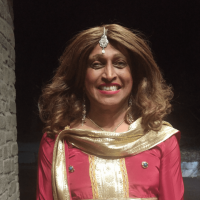 Angel Gonsalves - Advocate and Activist
Angel Gonsalves - Advocate and Activist
Angel is a retired senior TWOC, born in Mombasa, Kenya and became a displaced person at age 15. In 1972, Angel went to Switzerland where they lived and worked illegally, then came to Canada in 1974 as an Engineering student and have been contributing to nation building ever since.
Angel contributes to advocacy in many sectors such as 2SLGBTQIA+ National Housing Solutions with Chief Commissioner, Marie Claude-Landry of the Canadian Human Rights Commission in Ottawa and Federal Housing Authority, Marie Josée-Houle in Ottawa and on the policy formulations committee for SSLTC’S, as well as on the implementation, training and accountability of the Leading and Learning with Pride Toolkit with the City of Toronto.
Angel is a member of the Senior Pride Network in Toronto as well as the Older Adults’ program and sits on its Advisory Committee at the 519. She is also on the organising committee for the Trans Day of Remembrance, and advocates and provides material supports such as housing, medical doctor for continuity of Trans care, employment, education, food, clothing, mentorship and more to Trans newcomers to Canada.
Angel is also part of a committee to assist victims of Trans Human trafficking with Chris Glover MPP, Richard Dunwoody of Project Recovery as well as Kimberly Curry, Executive Director of Yellow Door and an advocate for home care to the Ontario government. Lastly, Angel was the recipient of Community Hero Award from Dr. Jill Andrew, PhD, MPP of ward 12 where she resides.
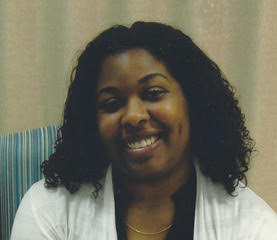 Chantelle Harriott
Chantelle Harriott
Toronto Grace Health Centre, Assess and Restore Social Worker, and Social Worker in the Remote Care Monitoring Program
Chantelle Harriott was born and raised in Toronto. She attended York University where she obtained honours degrees in both sociology and social work. She completed a masters degree in gerontology at the University of Toronto. Chantelle worked at SPRINT Senior Care in the Adult Day Program for 14 years providing dementia education and caregiver support. During that time, she collaborated with Sunnybrook’s Geriatric Outpatient clinic providing case management, resource navigation, and caregiver support for their patients.
Chantelle recently obtained employment at Toronto Grace Health Centre as the Assess and Restore social worker collaborating with St. Michael’s Hospital GIM unit to provide support to seniors who are at high risk of readmission to hospital post discharge from rehab. She is also the social worker in the Remote Care Monitoring program with Toronto Grace and provides support to seniors enrolled in their program.
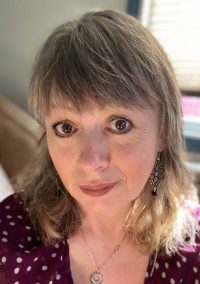 Belinda Lacombe - British Columbia Association of Community Response Networks, Regional Mentor
Belinda Lacombe - British Columbia Association of Community Response Networks, Regional Mentor
Belinda Lacombe (Metis) works as a therapist/counselor in the anti-violence/oppression sector, where her practice is genocide informed and advocates a decolonizing approach to therapy and community development. She is a Regional Mentor with the British Columbia Association of Community Response Networks; nd a provincial advisory committee member for delivery of the province-wide Indigenous Communities Healing Project.
She is an instructor, and coach for the Aboriginal Focusing-Oriented Therapy training programs and delivers the Indigenous Tools for Living programs. As a survivor of cultural genocide, and as a statement gatherer of the National Murdered and Missing Women and Girl’s Inquiry, Belinda understands and affirms that culture and focusing body-centered therapy skills save lives.
Every year, on June 15th, we all join forces to remind the world that human rights don’t get old. This World Elder Abuse Awareness Day (WEAAD), we’re inviting Canadians of all ages to become a Champion of elder abuse prevention by pledging to stand up for the rights of older people.
CNPEA, in partnership with EAPO, CanAge and the British Columbia Association of Community Response Networks (BCCRN) invite you to this national virtual WEAAD event on June 15th, from1:00 – 2:30 EST. We’ll be bringing together experts on aging and elder abuse, politicians and community members to discuss what we can all do to ensure older Canadians are safe from abuse and neglect. Speakers from across Canada will share their views and experiences, sparking social change, advocating for senior’s rights and combatting ageism.
WHEN:
Monday, May 30, 2022
1:30 PM to 3:00 PM Eastern /
10:30 AM to Noon Pacific
About
Each year on June 1, Canadians recognize Intergenerational Day (IG Day) to celebrate the mutual benefits of building relationships across generations.
CNPEA and EAPO, in collaboration with I2i Society and IG Connections, are hosting a webinar to highlight IG programs and initiatives across the country. These include: GrandPals (ON), Mutual Mentoring Program (AB), and special High School programs in New Brunswick. We will also introduce the new Intergenerational Action Plan in New Brunswick. Our fabulous speakers will share their experience, talk about how IG connections can encourage social involvement and transfer of knowledge, and build on the strengths of youth and seniors to foster stronger communities. We will also explain how you can get engaged, by implementing and adapting intergenerational programs in your communities or by volunteering with local initiatives.
Between March 29 and March 31, 2022, CNPEA and partners presented a series of five learning modules, hosted by NICE. The first module of the series provides an overview of Future Us. The next four examine priorities and opportunities for addressing elder abuse in Canada in research, practice, policy and the law.
Page 9 of 16


